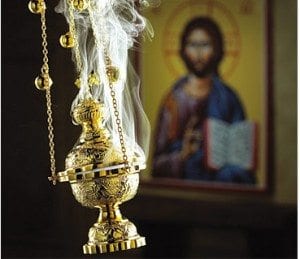Psalm 140

In his Letter to Marcellinus, St Athanasius states that within the Psalter you will find “all the movements of your soul, all its changes, its ups and downs, its failures and recoveries.” How blessed then are we that the Orthodox Church has enriched its services by use of the psalter. The vespers service in particular includes the chanting of psalm 140 in its entirety. It begins with the pleading words “Lord, I have cried out to you, hear me. Receive the voice of my prayer when I cry out to you”, and is chanted according to the tone of the week.
As the second verse is chanted “Let my prayer be set forth as incense before you, the lifting up of my hands as an evening sacrifice”, the priest incenses the whole church and all the faithful. This creates the ideal environment for us to pray with the psalmist and make our own the petitions to God in this psalm. Incense is also revealed to be the visible sign of God’s throne in Revelation (5:8, 8:3-4). The “lifting up of my hands” captures the intimacy of a child reaching out and lifting up its hands to be taken up by the parent. Taken with verse 8 “do not leave my soul destitute”, this intimacy is clearly between the soul and its creator and the aim is to lift our mind (nous) up to the throne of God as the incense rises.
Psalm 140 goes on to ask the Lord for the purification of our hearts and thoughts, to guard our mouth and lips from uttering evil things and to protect us from those who work iniquity. Furthermore, it asks for our correction by righteous people in quite a violent way, stating that their strikes are a kindness and their rebukes as anointing oil, teaching us that the path of righteousness is a struggle, but one that we must overcome with much sweat and blood so that we too may be anointed with the grace of the Holy Spirit. In this trial we are beaten down all day as though “our bones are scattered by the mouth of the grave.” The psalm concludes by re-affirming that our eyes must remain upon the Lord who is our refuge, and our deliverer from the snares and traps which are laid around us.
Source: Lychnos October-November 2020
